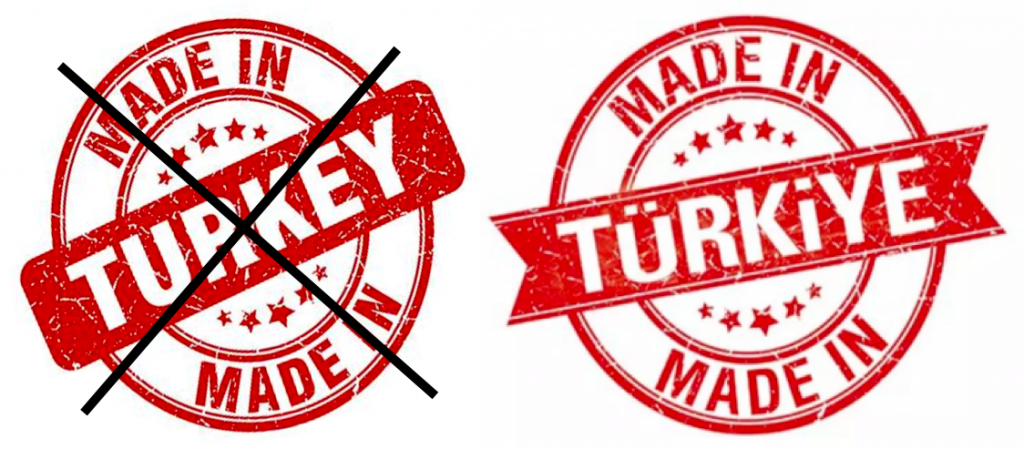Last week on June 1, the United Nations Secretary General’s Spokesperson Stéphane Dujarric proclaimed that Turkey will be referred to as ‘Türkiye’ in all foreign languages from now on.
The change had been promptly approved by António Guterres, the UN Secretary-General, following a formal request by Türkiye’s Foreign Minister Mevlüt Çavuşoğlu at the end of last month.
“The process we started under the leadership of our President Recep Tayyip Erdoğan to elevate the value of our country’s brand is finally coming to an end.
“With the letter I sent to the UN Secretary General today, we are registering our country’s name as “Türkiye” in foreign languages under the UN,” tweeted Çavuşoğlu in Turkish on May 31.
The phrase “Made in Türkiye” came to the fore on 27 December 2019 when President Erdoğan stated his preference on how to describe products made in the country while he was helping to promote a Turkish national car brand. Turkish industry quickly adopted the slogan.
By the following month, January 2020, leading export body TİM (Türkiye Exporters Assembly) had formally started to use “Made in Türkiye” in their marketing.
Ülkemizin marka değerini yükseltmek için Sayın Cumhurbaşkanımız @RTErdogan liderliğinde başlattığımız süreç nihayete eriyor.
BM Genel Sekreteri’ne bugün gönderdiğim mektupla ülkemizin BM nezdinde yabancı dillerdeki adını da “Türkiye” olarak tescil ediyoruz.
Hayırlı olsun! 🇹🇷 pic.twitter.com/Zd9UIv2eVy
— Mevlüt Çavuşoğlu (@MevlutCavusoglu) May 31, 2022
The country’s rebranding process was formalised by the Turkish leader late in 2021. On December 3, President Erdoğan signed a decree which stated that in all international official correspondences, activities and on exported products ‘Türkiye’ and “Made in Türkiye” will be used instead of ‘Turkey’.
The decree noted that ‘Türkiye’ as a phrase is the most ideal representation of the Turkish nation’s culture, history and values.
While the change grabbed a lot of attention online, it will take time to adjust, with many commentators still referring to the country by its old name.
The Turkish rebrand follows a well-trodden path, with many other states opting to be known by another name. The Netherlands (formerly Holland), Sri Lanka (Ceylon), the Republic of North Macedonia (Republic of Macedonia), Eswatini (Swaziland) Czechia (Czech Republic), Cabo Verde (Cape Verde) are just some of the countries that have changed their official names within the last decade or so. Many more countries might be inclined to follow their lead in the future.
For Turks, the change can be viewed as beneficial for multiple reasons. One of the big reasons to adopt ‘Türkiye’ as the official name in the native language is to distance the country from the anglicised ‘Turkey’. This word is also the name of a large bird native to North America, which is famous for being served on Christmas menus or Thanksgiving dinners. Many Turks believe the name ‘Turkey’ served as a form of ridicule of their country.
Other factors also come into play with the rebrand, which Turkish officials hope will help strengthen Türkiye’s identity and dissociate from other perceptions and foreign language definitions.
For centuries, the West has depicted Turks as barbaric and foolish, especially during the Ottoman Empire era, creating deep-rooted negative stereotypes, which may take longer to dislodge.
Aside from foreign considerations, the timing of the rebrand has also generated strong opinions inside Türkiye, with citizens using online platforms to vent their views.
Many have aired they are happy with the name change to Türkiye and feel it will help how the country is perceived internationally.
Others are pointing out that it is the least of the country’s problems, given Türkiye is in the midst of a major economic crisis. Inflation soared to 73% in May – the highest in 23 years – following a steep rise in food and energy costs.
With Presidential elections looming in 2023, some have argued this rebrand is Erdoğan’s latest attempt to deflect attention from the growing economic and political woes in the country. Others point to the republic celebrating its centenary next year, allowing more time for the name change to take root.
While the debate about why the Turkish leader has pushed for change right now continues, the fact remains “Türkiye” is the official country name in all languages.





